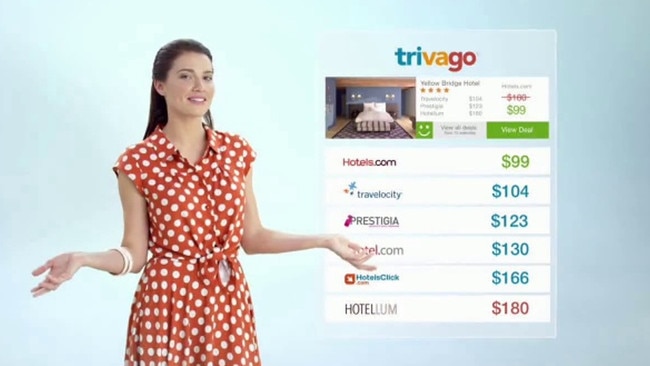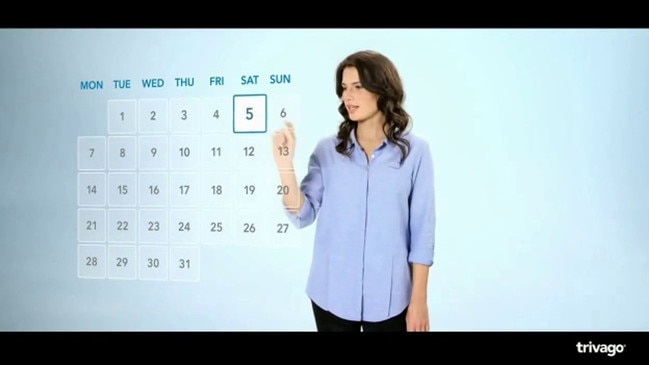Trivago court ruling is ‘a win for travellers’; ACCC seeking million-dollar penalties
ACCC seeking million-dollar penalties after Federal Court’s Trivago ruling that travel giant misled holidaymakers.

Australia’s consumer watchdog hopes multimillion-dollar penalties will be issued against hotel booking site Trivago, as industry veterans say a groundbreaking Federal Court ruling that the travel giant misled holidaymakers could lead to the end of “sponsored posts”.
However Rod Sims, chair of the Australian Competition and Consumer Commission, warned that it would be “very complicated” for individual customers to get compensation from Trivago in the wake of the ruling, that found Trivago aired misleading claims more than 400,000 times from late 2013 to mid-2018.
On Monday, the court found Trivago guilty of misleading and deceptive conduct for suggesting its first placed prices were the best, when in fact they were simply the prices generating the highest Trivago commissions.
Justice Mark Moshinsky said in his ruling that “the Trivago website did not quickly and easily identify the cheapest rates available for a hotel room responding to a consumer’s search’’.
“Importantly, in at least some cases, the cheapest offer for a hotel room was filtered out and therefore did not appear on the Trivago website,” he said.
Speaking after the ruling, Mr Sims said he was “delighted” at the success of his organisation’s legal action, and hoped it would send a message to an industry where the “really outrageous behaviour” is “certainly a broader issue”.
He said not only did Trivago filter out the best prices in some instances, but that it gave consumers “the impression you’re getting much larger discounts than you actually were”.
“Often the comparisons were between a luxury room and a standard room. So they strike through one price or put one price in red and one in green ... the comparison was not like for like,” Mr Sims said.
Mr Sims said compensating victims of Trivago’s misleading claims was “a tricky issue”, saying on average consumers spent between $10 to $40 extra a night on rooms.
“Across a very large number of customers, you’d have to go back and find out exactly what happened on that day. It’s very complicated”.
Mr Sims said the penalties for most of what Trivago has been found guilty of doing go up to $1.1m per breach, with a small amount of the behaviour coming under a newer penalty regime of up to $10m per breach or 10 per cent of turnover, whichever was highest.
“Usually, the court aggregates these things. We’ll be seeking penalties in the millions.” Mr Sims said.
He also urged consumers to “be very sceptical” when booking with hotel aggregating sites.
“Have a good look at how the company is making its money. They’re never doing anything for free on the internet. They’re always out to make money from you,” Mr Sims said.
Travel industry veterans have said the ruling might have far-reaching implications for online booking websites, possibly forcing platforms to reassess whether they should take revenue from sponsored listings.
“Marketing in online travel is brutal and intensely competitive. There are billions of dollars to earn each year by being the best at travel marketing,” Rod Bishop, the boss of ASX-listed travel booking company Jayride, told The Australian.

“It must be tempting to squeeze out that little extra with a sponsored listing but it’s extremely important to remain impartial and transparent.”
Mr Bishop said as the boss of an online travel marketplace he feels a strong obligation to both travellers and suppliers to be as upfront as possible.
“Loyalty is critically important and the very last thing you want to do is alienate a traveller or a supplier, so you’ve got to be completely transparent in terms of how you make your recommendations,” he said.
“We strive every day to make sure travellers get the best comparison on their rides around the world, and that means allowing travellers to get the most relevant and best results every time. Clearly there’s the potential for sponsored listings to distort that.”
He added that his priority is for suppliers who provide fantastic service to win on their merits, not just because they pay more.
“Sponsored listings clearly can have negative repercussions to how people perceive your marketplace,” he said. “For us at Jayride sponsored listings fly against our mission which is to lean into the traveller experience and make sure every ride is great. Sponsored listings are not in our DNA.”
Meanwhile longtime industry executive Rod Cuthbert, the founder and former CEO of booking website Viator and former boss of travel search platform Rome2Rio, told The Australian that he believes much of the issue comes down to Google diverting web traffic to its own hotel products.
He said Google’s manoeuvres force online hotel sites like Trivago and Booking.com to increasingly look to offline advertising to build brand awareness and loyalty.
“Because none of these sites can actually offer a price advantage, it’s really dangerous for them to make claims around the room rates they offer,” he said.
“They’d be better off focusing on their ease of use, customer service, product range or some other feature... Anything but price. The only problem is that the thing customers care most about is price.
“The real story here is Google’s abuse of their status as the monopoly search engine. They’re bleeding these websites of traffic and it’s starting to hurt.”
The matter will return to the Federal Court for case management at a later date.
A Trivago spokeswoman told The Australian that in light of the judgment, the company was “working to quickly understand the implications of this decision on our website design and its overall impact on the Australian travel industry”.
“The judgment received yesterday from the court provides new guidance on how results of comparator websites, like Trivago and others, should be displayed in Australia. Trivago will closely review today’s decision.” she said.




To join the conversation, please log in. Don't have an account? Register
Join the conversation, you are commenting as Logout